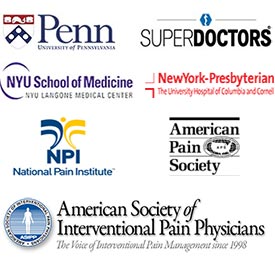Posterior Cruciate Ligament (PCL) Knee Injury Doctors
At Manhattan Pain and Sports Associates you’ll get the PCL diagnosis, knee pain management, and medical care you need to reduce or eliminate your PCL pain. Because when you’re in pain — whether it’s from an accident, age, sports injury, or ailment — you want relief. Appropriate and targeted PCL treatment starts with a diagnosis from our specialists.
Posterior means back or rear. So your posterior cruciate ligament (PCL) runs from the back of your tibia, which is the weight-bearing bone in your shin, around the knee up to the front of your femur or thigh bone. Along the way, it crosses over your anterior cruciate ligament (ACL), creating a secure brace inside your knee. The PCL keeps your knee from bending backward.
Like the other three ligaments present in your knee joint, the posterior cruciate ligament is a tough fibrous ribbon that connects two bones. Because of its position inside the knee, you’re less likely to hurt it. In fact, you’re more likely to injure your ACL. If you do injure your PCL, it may be less painful, but it can still require anywhere from a couple weeks to several months to heal.
The Cause of PCL Injuries
The only ways to injure your posterior cruciate ligament is to:
- Get hit right beneath your kneecap
- Land hard on your bent knee
This type of blunt trauma happens only occasionally in Manhattan, but you can injure your PCL if you’re in a car accident or if you hurt it while playing a contact sport like football. The blow to your shin bone while your knee is bent can move the bone backward in the joint, stressing the PCL. This type of injury can only happen while your knee is bent.
What a PCL Injury Feels Like
If you hurt your posterior cruciate ligament you’ll likely feel knee pain and won’t be able to put much weight on your leg, not only due to the pain, but also because your knee will feel unstable. Additionally, your knee is going to swell within hours of the accident or injury.
It’s also possible to hurt your PCL and not realize it at the time. If it’s a mild sprain, your knee might not even swell noticeably. But if you feel your knee getting more painful in a few days to a week, you may have injured your posterior cruciate ligament and should seek medical attention from your doctor or a highly rated NYC pain management specialist.
Diagnosing a PCL Injury
Since these injuries are rarer than ACL injuries, your pain management doctor may need to run additional tests to confirm the diagnosis. Be prepared to describe the accident to your doctor and answer questions about where and when your knee hurts. All that information helps your doctor determine the cause of your knee pain.
You may also need to have an MRI scan or a series of X-rays. In particularly difficult cases, your pain management doctor may need to perform an arthroscopy, a minor surgery in which your doctor inserts a tiny camera into your knee to look at the actual damage.
Treating a PCL Injury
While you may need crutches or a knee brace temporarily, you normally won’t need surgery — just some anti-inflammatory pain medication and physical therapy. Certain exercises, which your physical therapist can teach you, will strengthen your knee and improve its stability.
If the swelling in your knee doesn’t subside, you may need to have the excess fluid removed in a process called aspiration. If you’ve injured your PCL seriously enough or if you’ve injured other ligaments or structures in your knee in addition to your PCL, you may need arthroscopic surgery.
Get the PCL Injury Pain Relief You Need
Your NYC knee pain management doctor will get you back to your normal routine with minimal downtime. After your diagnosis is confirmed, your doctor begins your treatment plan with the most conservative pain relief treatment. You’ll always receive non-invasive pain relief before your doctor turns to more invasive procedures like surgery.
Manhattan Pain and Sports Associates
51 East 25th St, 4th Floor, Ste B
New York, NY 10010
(212) 533-3954



